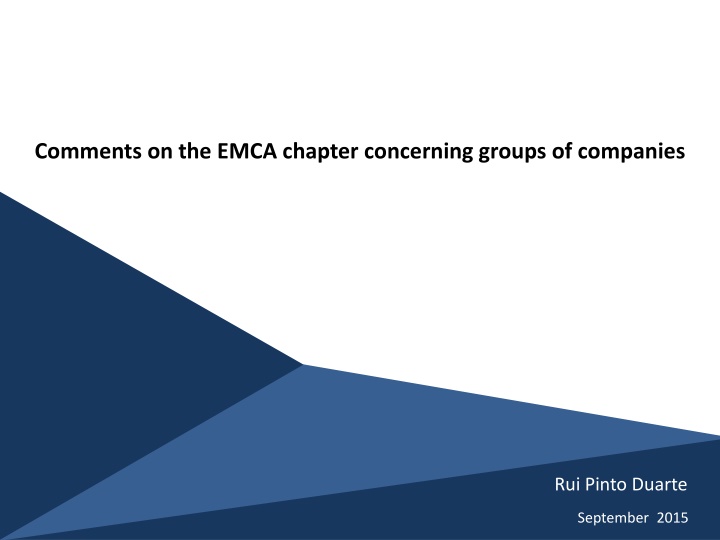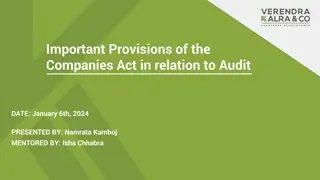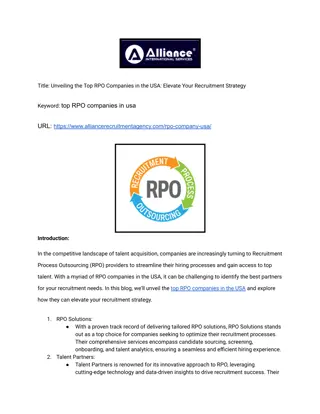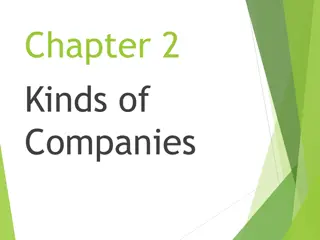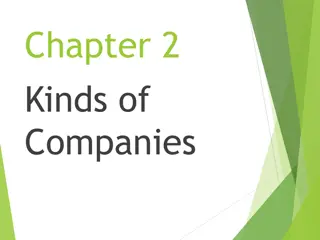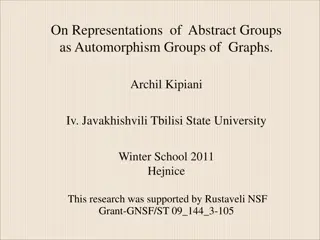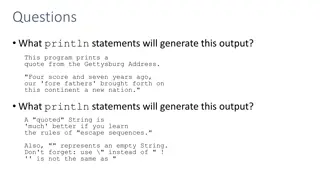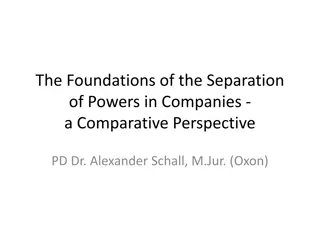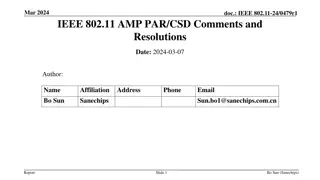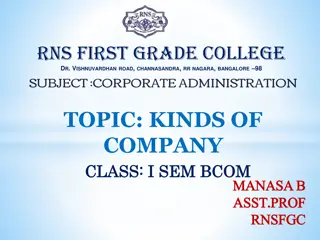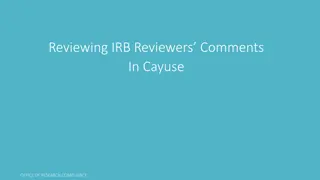Comments on the EMCA chapter concerning groups of companies
This content provides detailed comments on the EMCA chapter concerning groups of companies by Rui Pinto Duarte in September 2015. The comments cover various sections including the definition of control, organization of the chapter, and key attributes related to the regulation of groups.
Download Presentation

Please find below an Image/Link to download the presentation.
The content on the website is provided AS IS for your information and personal use only. It may not be sold, licensed, or shared on other websites without obtaining consent from the author.If you encounter any issues during the download, it is possible that the publisher has removed the file from their server.
You are allowed to download the files provided on this website for personal or commercial use, subject to the condition that they are used lawfully. All files are the property of their respective owners.
The content on the website is provided AS IS for your information and personal use only. It may not be sold, licensed, or shared on other websites without obtaining consent from the author.
E N D
Presentation Transcript
Comments on the EMCA chapter concerning groups of companies Rui Pinto Duarte September 2015
Index General Comments Comments on the General Comments of the Chapter Comments on the organization of the chapter Comment on the Definition of Control (Terminological) Comment on Sections 4, 5 and 6 Comment on Section 10 Comment on Section 11 Comment on Section 15 Comment on Section 16 Comment on Section 17 2
General comments 1 Generally speaking the chapter seems to adopt balanced solutions capable of generating convergence of views. 3
General comments 2 For the avoidance of doubt, I point out as solutions capable of generating such convergence: The choice of the concept of control as the basis for the regulation of groups; The cross-border range of the definition of group; The imposition to the parent companies of the duty to disclose control; The attribution to the parent companies of the right to give instructions to the management of the subsidiaries; The attribution to the management of the parent companies of the right to obtain information from the subsidiaries (about them); The attribution to the shareholders of the subsidiaries of the right to obtain information (about the group) from the parent companies; 4
General comments 3 The attribution to the companies that become holders of a very high percentage of the shares of a company of the right to squeeze-out the other (ultra-minority) shareholders; The attribution to the (ultra-minority) shareholders of a company that becomes almost totally controlled by another of the right to sell-out their shares to the controlling shareholder; The attribution of relevance to the interest of the group in the management of the subsidiaries; The imposition of liability to the parent companies for the unpaid debts of the subsidiaries in case the nonpayment derives from economic incapacity caused by the interference of the parent companies in the management of the subsidiaries. 5
General comments 4 The probability of success of the proposals is naturally closely linked to their details. As a general guideline I point out that EMCA should search great common denominators and express them in words as neutral (from a doctrinal standpoint) as feasible. This is tantamount to keep silence on polemic issues whenever possible. 6
Comments on the General Comments of the Chapter 1. The statement the group of companies and not the single company is the prevailing form of the modern enterprise seems inaccurate (not supported by statistics) if one takes in account all the companies irrespectively of their size. Such inaccuracy is not relevant, but serves as example of a statement that might be avoided. 2. If the main objective of the chapter is to establish rules aiming at enhancing the formation of groups of companies, special attention should be paid to the liability of the parent companies trying to avoid ambiguities. 7
Comments on the organization of the chapter 1 The chapter is divided into four parts: Definitions, Group Management, Protection of Shareholders of the Parent Company and Protection of Shareholders and Creditors of the Subsidiary. I think such organization can be improved. 1. The part Definitions comprises one section containing Definitions plus one section (section 8) that rules the duty of the management of the parent company to inform the management of the subsidiary of the establishment and of the removal of the control as well as the duty of the subsidiary to inform the parent company of the number of shares and voting rights held by the subsidiary in the parent company and in any other companies. In my opinion section 8 not being a definition should not be included in part one. 8
Comments on the organization of the chapter 2 2. The main question that the shareholders, the directors and the creditors of the parent companies and the creditors of the subsidiaries wish to see answered is if and to what extent a parent company is liable for the debts of a subsidiary. Therefore I think it should be considered to address such question in an autonomous part. The right to squeeze-out flows out group management. In so far I doubt that the relevant rule should appear in part 2. On the other hand the right to squeeze-out is closely related with the right to sell-out. Perhaps it would be advisable to have an autonomous part with sections 11 and 15. 3. 4. 9
Comment on the Definition of Control It should be considered to curve out of the rules the situation in which control lasts for a short period, e.g. situations initiated and ended within less than one year. 10
(Terminological) Comment on Sections 4, 5 and 6 The opposition between de jure and de facto control shall cease to be conceptually accurate from the moment the law foresees the so-called de facto groups It would be preferable to find other expressions (e.g., control arising from voting rights and control arising from other sources ). 11
Comment on Section 10 It should be considered to extend the right of access to information at the level of the subsidiary to the chartered accountant and to the members of the supervisory board of the parent company. 12
Comment on Section 11 The right to squeeze-out should be foreseen as a Gestaltungsrecht , i.e. a right which exercise does not depend on the collaboration of the minority shareholders. On the other hand, to protect the minority shareholders the effects of the squeeze- out should depend on the payment of the price (or on its deposit to the order of the minority shareholders). I agree with Vanessa Knapp s observation that the right to squeeze-out should not be characterized as a redemption right, but as a right to buy. 13
Comment on Section 15 In my opinion the right to sell-out should not be exercisable at any moment. It seems justifiable that such right arises when one company takes the control of another (whereas being the rule that ascribes the right to sell-out in force the acquiring company may have in account the value to spend with acquisition of the shares of the minority shareholders). It seems less reasonable that after some time the parent company may be surprised with the need of spending money to pay the price of the shares of the minority shareholders. I agree with Vanessa Knapp s observation that the right to sell-out should not be characterized as a redemption right, but as a right to sell. 14
Comments on Section 16 1. In (1) (b) should be clarified if the benefit/gain/advantage is the one of the subsidiary or the one of the group. 2. In (1) (c) the reference to the first sentence is ambiguous. 3. The relation between the rules of section 16 and the liability of the parent company for the debts of the Subsidiary Company should be clearer. 15
Comments on Section 17 1. The title wrongful trading seems inaccurate. The liability does not depend or may not depend on wrongful trading. Vanessa Knapp s observation seems to converge with mine. The liability of the parent company should encompass only debts incurred after the takeover of the control. The attribution to the liquidator or equivalent of the subsidiary of the exclusive right to claim compensation gives such liquidator too much power. I suggest at least to foresee that the liquidator is obliged to exercise such right if creditors holding a certain percentage of the debts of the subsidiary request it. 2. 3. 16
The End Thank you for the opportunity to cooperate with you and to participate in this workshop. Rui Pinto Duarte 17
